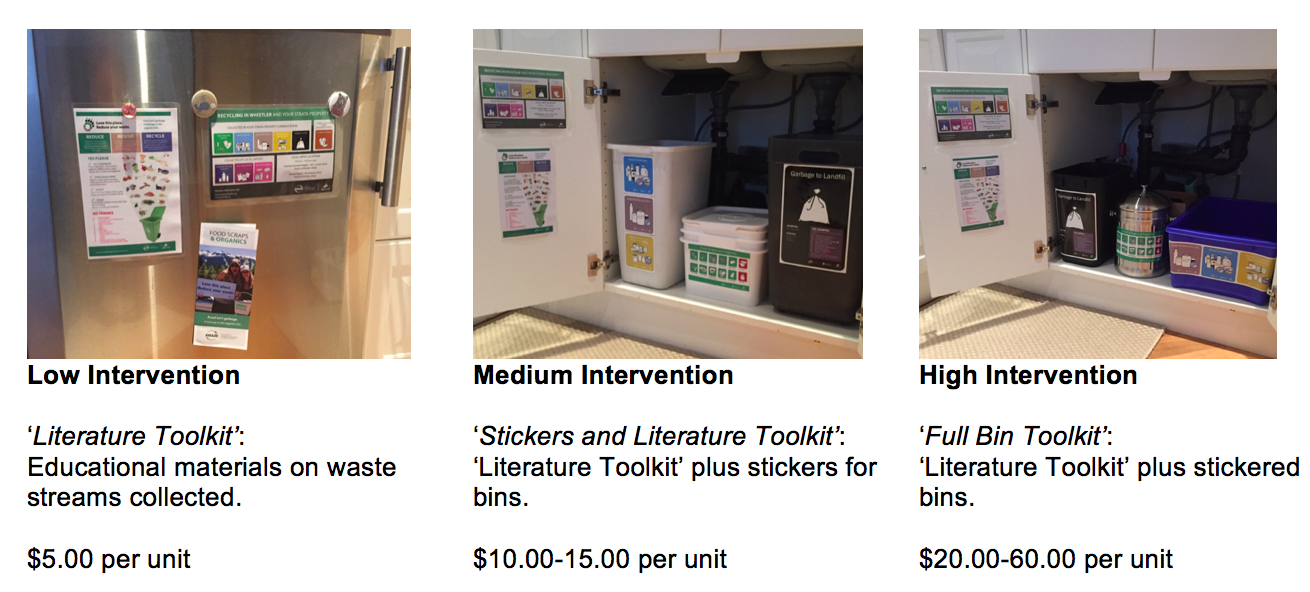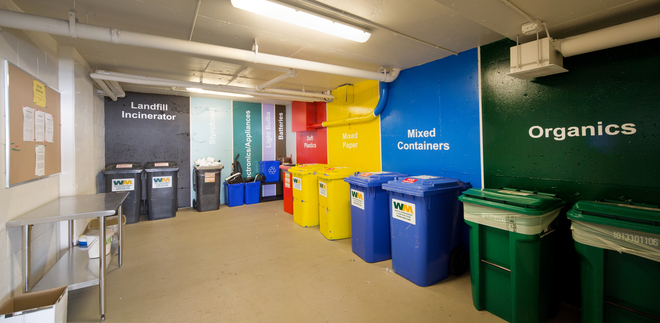2017 Multi-Family Accommodation Strata Waste Pilot – Testing In-Unit Toolkits To Increase Recycling and Organics Diversion
A 2014 audit of Whistler’s waste showed the multi-family accommodation and commercial sector produced 64% of the waste Whistler sent to landfill. Another audit of commercial and strata garbage found that 54% of the garbage stream could have been diverted for composting. An additional 13% could have been recycled and only 22% of garbage sent to landfill was actually classified as garbage.
Community conversations on how to solve this problem were heavily focused on the variety of occupancy types in Whistler’s multi-family accommodation properties and especially properties heavily used for short-term rental, where guests may only access the garbage room on the final day of their stay and may be unaware of the different waste streams collected. Adopting a solutions-focused approach, AWARE worked with stakeholders to create a pilot project to design, test and share a variety of in-unit toolkits to make it easier for unit occupants to accurately separate food scraps and recycling.
In 2016 AWARE partnered with three identical strata accommodation properties in Whistler’s Upper Village to test different in-unit recycling toolkits. Each property comprised of a mix of occupancy types, from short-term rentals to owner occupied, with over 110 units across the three properties. The toolkits varied in cost and the effort needed to install – ranging from printed education materials that could be mailed, to pictorial colour-coded bin labelling kits, to ready-to-install under the sink waste collection bins. The effectiveness of each toolkit was evaluated by auditing waste in each properties garbage room and surveying property owners and occupants to gain insight into the usage and perceptions of the toolkits from unit occupants.
The aim of the Accommodation Strata In-Unit Toolkit Pilot was to support improvements in waste diversion rates in the accommodation sector by testing practical tools that could subsequently be shared with other properties. Through this project three different toolkits were developed to test in the properties:
Key Recommendations
The results of the pilot have been used to create a list of key recommendations for other properties:
- Prepare Owners & Occupants –
- When preparing to revise waste management collection provide all unit owners and occupants with information on the changes being implemented at least 6 weeks in advance to give them time to prepare for the change. Include, why changing the way waste is managed is important, and provide guidance on materials that will and will not be collected.
- For rental accommodation properties, in addition to owners and strata management companies, ensure that property rental companies and cleaning contractors have also been advised.
- Outfit the Garbage Room –
- Install clear signage, which mirrors the colour-coded signage that has been standardized throughout the regional district in order to encourage consistency and familiarity
- Ensure the garbage room is well-lit and tidy so that people are comfortable taking the time to sort waste
- If accepted by your hauler, consider providing compostable bags to help minimize the contamination that results from the confusion surrounding this item.
- Outfit Units –
- Outfitting the unit with an in-unit system that reflects the multiple streams of waste collected in the garbage room informs visitors on what is and is not collected in the garbage room prior to visiting the garbage room.
- For short-term rental properties opt to provide the highest level of intervention by providing a full suite of labelled bins and educational materials.
- Providing a blanket system throughout all units in a property ensures consistency for all unit users, as well as service staff.
- Launch – remind all stakeholders of upcoming changes and ensure all systems are in place in both the units and the garbage room
For detailed results read the Strata Accommodation Pilot Project report
The Resort municipality of Whistler (RMOW) has updated the Solid Waste Management bylaw and this will change the way Whistler manages its waste. The updated bylaw now requires all properties to separate both recyclable material, and food scraps & organics from garbage sent to landfill.
In recognition that some properties will need help adapting to the updated waste regulations a series of workshops are being offered to help people prepare. Separate workshops are being offered for the Commercial and Multi-Family Accommodation sectors so content can be tailored to the needs of attendees.
| WORKSHOP | DATE | TIME | LOCATION | |
|---|---|---|---|---|
|
Solid Waste Solutions Workshop: Multi-Family Accommodation Properties |
Tuesday, October 24th | 8-9AM | Whistler Public Library | Registration closed |
|
Solid Waste Solutions Workshop: Commercial Properties |
Tuesday, October 24th | 5:30-6:30PM | Whistler Chamber of Commerce | Registration closed |
| Solid Waste Solutions Workshop: Commercial Properties | Wednesday, October 25th | 8-9AM | Whistler Public Library | Registration closed |
|
Solid Waste Solutions Workshop: Multi-Family Accommodation Properties |
Wednesday, October 25th | 5:30-6:30PM | Whistler Chamber of Commerce | Registration closed |
The workshops will provide:
- A brief overview of the RMOW’s revised Solid Waste Bylaw
- Practical guidance on updating shared waste storage spaces in Commercial and Multi-Family Accommodation properties – from building and retro-fitting garbage rooms to access and signage.
- Key steps to take to ensure unit occupants use new waste systems successfully – from engaging long-term residents and short-term visitors to training staff and monitoring waste within a business.
- Access to a wide-range of free guides and tools to take away and use following the workshop.
FREE Signage & Educational Materials For Your Property:
In Whistler, especially in high-density core areas, many properties contain both multi-family accommodation and commercial units, which often share share garbage rooms. In these properties implementation of new waste management systems will require a multi-pronged approach to pre-launch communications and post-launch monitoring. The tools below can help you determine the best approach for each user type.
All of the tools developed for the CEP Multi-Family Accommodation Pilot Project are available to download to help other accommodation units achieve similar result.
Waste Minimization Tools – Accommodation
All of the tools developed for the Commercial Organics Waste Diversion Project are available here for download to help local
Waste Minimization Tools – Commercial
Since everyone living in, visiting or doing business in Whistler creates waste, reducing and diverting waste from landfill makes sense for everyone. Improving solid waste separation supports a community shift towards shared zero waste goals and benefits all parts of society. In an effort to keep food scrap, organic and recyclable materials from ending up in the landfill, the RMOW updated the Solid Waste Bylaw in 2017, requiring all multi-family accommodation, and Industrial, Commercial and Institutional (ICI) properties to collect and divert organic and recyclable waste from garbage.
The 2016 Strata Accommodation Waste Pilot was possible thanks to funding from the Community Enrichment Program that issues grants from the RMOW to local community groups.



